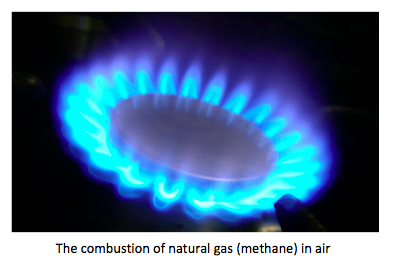Topics 5 & 15 : Energetics/thermochemistry
 Introduction to
Introduction to 
 Topic 5 and
Topic 5 and  Topic 15
Topic 15
If bonding is “the key to understanding Chemistry” (see Topics 4 & 14 : Chemical bonding & structure) then Energetics/thermochemistry is equally important as it underpins the whole of bonding. There are several ways in which Chemistry can be defined but essentially when a chemical reaction occurs bonds are broken and new bonds are formed. Breaking bonds requires energy and energy is given out when new bonds are formed.
At Standard Level this topic looks at the enthalpy change that occurs during a chemical reaction. We use the word enthalpy and not heat energy but certainly for Standard Level (and in truth also at Higher Level) the distinction between the two is not important. We do emphasise that most measurements for ∆H are done under standard conditions but not the fact that ∆H should only be used as the term when the pressure remains constant.
This topic lends itself to good practical work. Through the practical work you can understand the need for E = mass x specific heat capacity x temperature rise rather than just fit numbers into a remembered equation (q = mcΔT). You can also gain an understanding of what is meant by an exothermic reaction and the fact that not all enthalpy changes can be determined directly. Hopefully you can also understand that Hess’s Law is simply another way of stating the First Law of Thermodynamics (Law of Conservation of Energy).
 What is important throughout all of the sub-topics in Energetics/thermochemistry is the need to consider the states. I have even seen teachers, text book authors and lecturers at university (let alone students) use average bond enthalpies wrongly. For example, when determining the enthalpy change for the hydrogenation of unsaturated fats. It needs to be understood that you cannot just use average bond enthalpies as these only refer to the gaseous state whereas unsaturated fats are normally liquids under standard conditions. Changing state involves an enthalpy change. Another example where mistakes are often made is in calculations involving enthalpies of combustion (see image on the right). The definition of standard enthalpy of combustion involves water in the liquid state at 25 oC. Using just average bond enthalpies is bound to give the wrong answer unless the enthalpy change for the change of state in going from gaseous to liquid water is also included.
What is important throughout all of the sub-topics in Energetics/thermochemistry is the need to consider the states. I have even seen teachers, text book authors and lecturers at university (let alone students) use average bond enthalpies wrongly. For example, when determining the enthalpy change for the hydrogenation of unsaturated fats. It needs to be understood that you cannot just use average bond enthalpies as these only refer to the gaseous state whereas unsaturated fats are normally liquids under standard conditions. Changing state involves an enthalpy change. Another example where mistakes are often made is in calculations involving enthalpies of combustion (see image on the right). The definition of standard enthalpy of combustion involves water in the liquid state at 25 oC. Using just average bond enthalpies is bound to give the wrong answer unless the enthalpy change for the change of state in going from gaseous to liquid water is also included.
At Higher Level, the Born-Haber is in effect ‘just another enthalpy cycle’ although you will need to understand the importance of the lattice enthalpy. Where Higher Level really differs is that it brings in Gibbs free energy and the concepts of entropy and spontaneity. If you really understands and can apply the equation ∆G = ∆H - T∆S then you will be well on your way to understanding Chemistry.
Associated pages
5.1 Measuring energy changes
After studying this topic you should be able to calculate the heat change when the temperature of a pure substance is changed using q = mcΔT and perform a calorimetry experiment for an enthalpy of reaction...
5.2 Hess's Law
After studying this topic you should be able to understand Hess's Law states that the enthalpy change for a reaction that is carried out in a series of steps is equal to the sum of the enthalpy changes for the individual steps...
5.3 Bond enthalpies
After studying this topic you should be able to calculate enthalpy changes from known bond enthalpy values and compare these to experimentally measured values....
15.1 Energy cycles
After studying this topic you should be able to:UnderstandApply your knowledge to:Energy cycles permit the calculation of values that cannot be determined directly. This relates to the importance of replicating...
15.2 Entropy & spontaneity
After studying this topic you should be able to construct Born-Haber cycles for group 1 and 2 oxides and chlorides and energy cycles from hydration, lattice and solution enthalpy values...
The Nature of Science
I received an e-mail from a student (not someone I teach) who asked me, "What is this nature of science business?” So what exactly does the IB mean by the Nature of Science? Essentially it covers five key points…
Topics 5 & 15
Energy production and consumption are worldwide issues. There are many reasons why wars start. In the past it was often over territorial claims (for example the Second World War and the Malvinas/Falklands...

 IB Docs (2) Team
IB Docs (2) Team